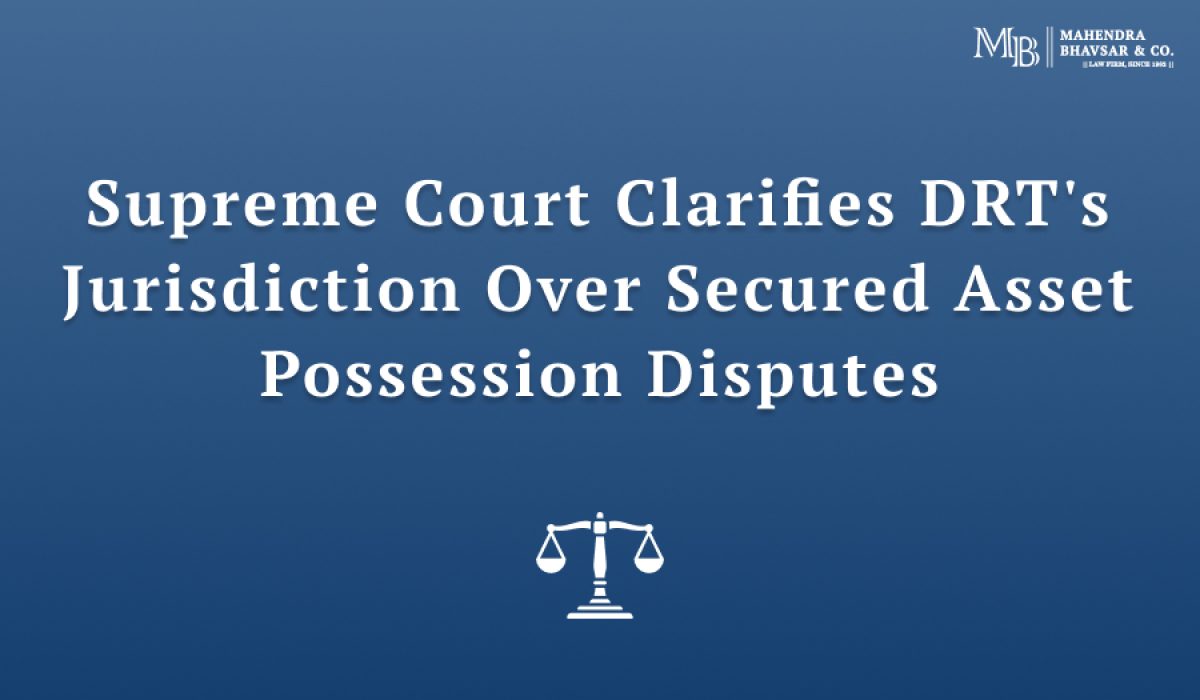The Supreme Court of India in Central Bank of India & Anr. v. Smt. Prabha Jain & Ors. (2025 INSC 95) clarified the jurisdiction of the Debt Recovery Tribunal (DRT) under the Securitisation and Reconstruction of Financial Assets and Enforcement of Security Interest Act, 2002 (SARFAESI Act). The judgment held that DRT lacks authority to restore possession of a secured asset to individuals who are neither the borrower nor in possession at the time of the bank’s intervention.
Facts of the Case
The dispute arose when Smt. Prabha Jain, the plaintiff, challenged the legality of a sale deed executed by her late husband’s elder brother, Sumer Chand Jain, in favor of a third party, Parmeshwar Das Prajapati. The latter subsequently mortgaged the property to the Central Bank of India. When the borrower defaulted, the bank invoked its rights under the SARFAESI Act, taking possession of the mortgaged property.
Jain filed a civil suit seeking declarations that the sale and mortgage were void, alongside a request for possession. The trial court dismissed her suit, citing a lack of jurisdiction due to Section 34 of the SARFAESI Act. However, the High Court overturned this decision, holding that the civil court could determine title disputes.
Key Legal Issues
- Whether the civil court has jurisdiction over disputes involving title and possession of mortgaged properties under SARFAESI.
- Whether DRT has the authority to restore possession to a person who is neither the borrower nor in possession at the time of bank intervention.
- Whether the High Court erred in reinstating the suit.
Arguments by the Parties
Appellant (Central Bank of India):
- The civil court’s jurisdiction is barred under Section 34 of the SARFAESI Act.
- DRT has exclusive jurisdiction to handle disputes arising from enforcement actions under Section 13(4).
- The plaintiff had no direct relationship with the mortgage transaction, making her claims irrelevant to DRT proceedings.
Respondent (Smt. Prabha Jain):
- The suit was based on ownership claims preceding the mortgage transaction, making it a title dispute beyond DRT’s jurisdiction.
- The sale and mortgage deeds were void, thus affecting the validity of the bank’s security interest.
- Section 17 of the SARFAESI Act does not empower DRT to adjudicate on title disputes.
Supreme Court’s Reasoning
1. Jurisdiction of Civil Courts under SARFAESI
The court reaffirmed that civil courts retain jurisdiction over disputes that DRT is not expressly empowered to adjudicate. Citing Mardia Chemicals Ltd. v. Union of India (2004) 4 SCC 311, the court emphasized that DRT cannot rule on ownership disputes unrelated to borrower-creditor relationships.
2. DRT’s Power to Restore Possession
Examining Section 17(3) of the SARFAESI Act, the court clarified that:
- DRT can only “restore” possession to a borrower or someone claiming through the borrower.
- The word “restore” implies returning possession to its pre-intervention status, not granting possession to a new claimant.
- The amended 2016 provisions did not confer new rights allowing DRT to adjudicate title claims.
3. Case Law Considerations
The court distinguished its ruling from Jagdish Singh v. Heeralal (2014) 1 SCC 479, which barred civil suits where DRT could grant relief. Instead, it relied on Bank of Baroda v. Gopal Shriram Panda (2021 SCC OnLine Bom 466), affirming that title disputes must be resolved by civil courts.
Conclusion and Implications
The Supreme Court ruled that DRT cannot restore possession of a secured asset to a person who was neither the borrower nor in possession before the enforcement action. The judgment reinforces the boundary between civil courts and DRT in SARFAESI matters, ensuring that title disputes remain under the civil court’s domain. This decision safeguards third-party claimants from being unjustly subjected to DRT proceedings when their claims arise independently of borrower-creditor relationships.
Legal professionals should consider this ruling when advising clients on property disputes involving SARFAESI enforcement. The decision underscores the importance of challenging mortgage validity in civil courts rather than DRT, ensuring rightful claimants have access to proper legal remedies.
Stay informed with insights that matter. Follow us for more updates on key legal developments.
